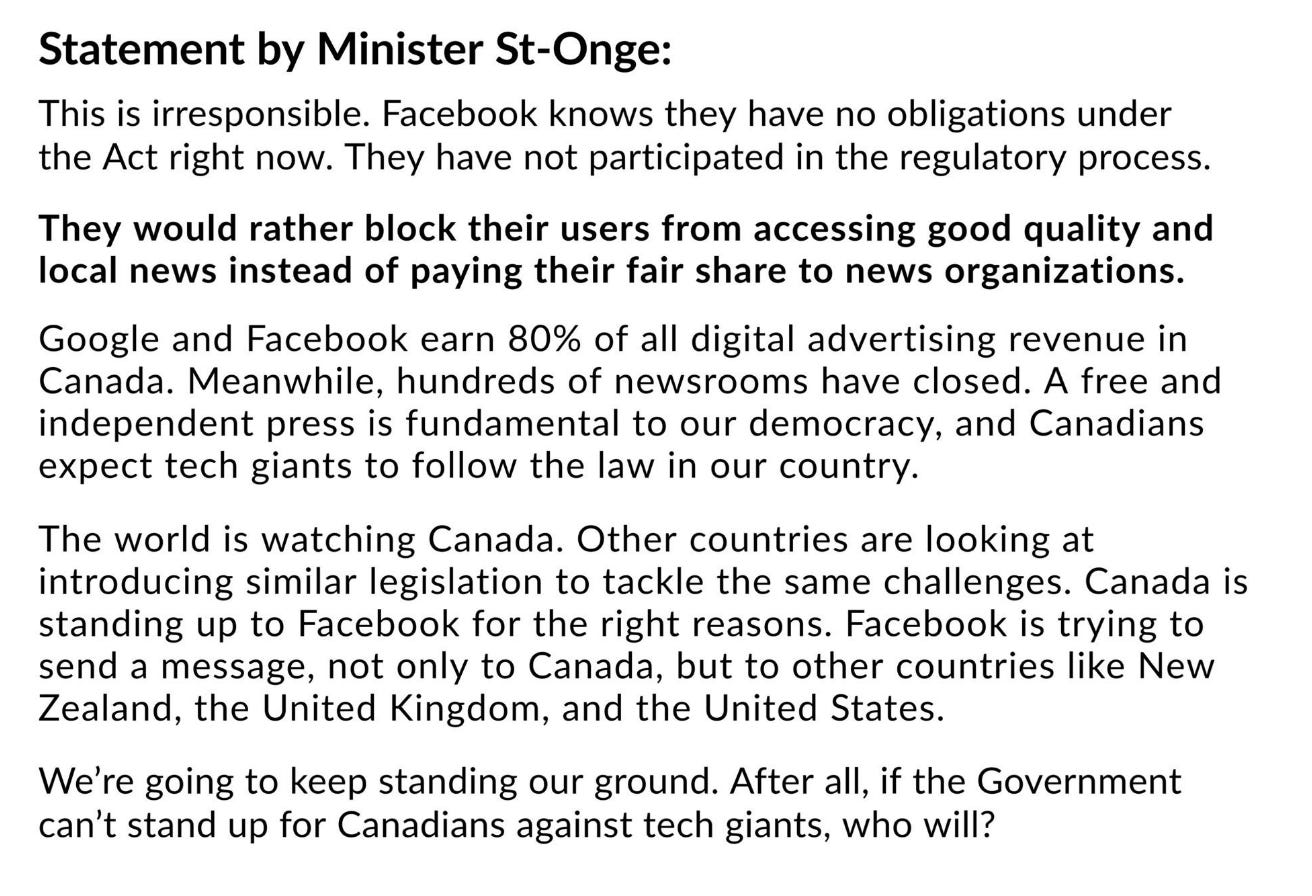Canada’s Censorship Campaign Continues
‘Experts’ call conspiracy theories acts of “slow violence”

Thanks to the Liberal government, Canada has been hard at work passing a slew of online censorship bills.
In April 2023, the government passed Bill C-11 (the Online Streaming Act) which gives unprecedented power to the CRTC to monitor and influence the media we consume, then just a couple months later, it passed Bill C-18 (the Online News Act), which requires online platforms to pay media outlets for sharing news content. We’re already seeing the impacts of this bill. Meta has refused to comply and has chosen to block Canadians from accessing news from their platforms. Google also followed suit and is blocking links to Canadian news in response to this legislation.
And now, the Liberal government is set to introduce a legislative package concerning the hotly debated ‘online harms’ legislation.
While we still don’t know what exactly will be in this legislation, we do know that the government has already held a number of roundtables and consultations that is centred on creating a “safe online space that protects all Canadians.” And it is through this lens that we can expect the legislation to be created.
The online harms legislation was first introduced in 2021 under former Heritage Minister Pablo Rodriguez. It was met with widespread criticism and has since been reassessed, with consultations restarting again in 2022.
With the recent cabinet shuffle, Heritage Minister Pascale St-Onge has now inherited this proposal. And it appears that this Heritage Minister is just as eager to clamp down on civil liberties as Pablo Rodriguez was. For those who may not know: Pablo Rodriguez was also behind introducing both Bill C-11 (Online Streaming Act) and Bill C-18 (the Online News Act).
Don’t get your hopes up that Pascale will be any different than Rodriguez, because she has already been steadfast in defending the aforementioned Online News Act, which has effectively blocked the free flow of information online.
Her team released the following statement in defence of Bill C-18:
Minister St-Onge claims that the government is simply trying to maintain a “free and independent press,” but how independent can the press really be if it’s been bought and paid for by the Liberal government? And how objective can it be if it follows a specific ideology? The millions in subsidies the CBC receives from the government does not lend itself to impartiality. Nor does its recent ideological commitment to DEI (Diversity, Equity, and Inclusion) lend itself to objectivity. DEI is as much ideological as it is political. This ideological commitment requires all employees, all stories, and all reporting to adhere to a certain set of values and biases. And if it doesn’t adhere to these values then the story doesn’t get told.
Ideological thinking is simply incompatible with maintaining journalistic integrity.
CBC’s own former employees can attest to this. Former CBC producer Tara Henley explains that the CBC adopted a specific ideological view — the ‘woke’ worldview — which led to its journalistic decline. She said,
“To work at the CBC in the current climate is to embrace cognitive dissonance and to abandon journalistic integrity.”
Canadian legacy media has proven it is incapable of adapting to digital trends, and instead of trying to pivot its strategy, legislators passed a bill that would require third party non-Canadian companies to bail out our legacy media. Does that make sense to anyone? Instead of blaming big tech, Canadian news outlets must adapt to the changing times. Mainstream Canadian journalists amount to paid propagandists at this point, and Canadians aren’t buying what they’re selling. Instead they are finding other ways to get their news, including from independent journalists who attempt to be objective in their analysis.
The most irksome line in the statement however is the last one: “After all, if the Government can’t stand up for Canadians against tech giants, who will?”
Where was this kind of pushback before? When has the government ever stood up for Canadians from any corporate entity, let alone big tech? If I recall correctly, the Canadian Government was all too happy to work with tech giants it now claims to protect us against before when they teamed up with Facebook, Twitter, and Google to fight against ‘Covid misinformation.’ Canada’s also the only G7 country that does little to even fight against regulating tech giants. It is only now when big tech fails to comply that the government feigns caring for its citizens.
As much as I like to criticize tech giants, I don’t fault them for haemorrhaging newsrooms — that’s on legacy media. I also don’t fault big tech for refusing to play this silly little game where they’re somehow expected to foot the cost of hosting news by approved Canadian news outlets.
I mention the above to give a better sense of where our new Heritage Minister’s head is at. I suspect she will treat the online harms legislation in much the same way Rodriguez did.
As mentioned, we don’t have the full details of this legislation yet, but we do know that a slew of consultations and roundtables were held, and based on the summaries, they were heavily informed by ideological actors who have a very obvious “woke” bias. When I say ‘woke,’ this is what I mean: it is a set of “anti-liberal ideological concepts masquerading as progressivism, but also as a status-seeking strategy within upper-middle-class white-collar social and professional subcultures.”
Here are just some of the noteworthy highlights from the consultations:
Some experts believe that the concept of ‘slow violence’ — i.e., content that becomes dangerous over time, such as conspiracy theories are considered harmful, because over time it can incite hatred, radicalize, and even lead to violence. (This is my first time hearing this term, but I suspect its usage will rise among ‘woke’ circles for the next little while—until another term comes along).
Experts said that the “ultimate goal of the regime ought to be a shift in the balance of content online in favour of ‘positive communication’ over ‘harmful communication’”. (How they would establish this, I’ve no idea, but this language is disturbingly similar to rhetoric used in authoritarian regimes).
Experts admitted that actually defining ‘harm’ is an incredibly difficult task, and considering the legislation is centred on reducing ‘harm’ this raises serious concerns about how impactful this bill will actually be.
Some experts said that not all harm is related to content — some harm can even come from user behaviour and systemic biases. One absurd example they gave was that women don’t receive online advertisements for jobs in science as much as men do (?!) and this, they say, is an example of ‘systemic harm.’
Experts said that something must be done about ‘disinformation’, but like ‘harm’, they admit that this term is also difficult to define (and easy to abuse). They point specifically to how disinformation was used during Covid and how it ‘undermine[d] democracy’ — though I’m curious to hear what specifically they thought comprised of disinformation considering everything we now know (and what many of us knew early on).
Experts want to levy financial penalties to regulatory bodies that don’t comply (this will probably go as well as Meta’s reaction to Bill C-18 went).
Some experts recommended that an independent ombudsperson should be established to support “victims who need guidance concerning problematic content or platform behaviour.” Usually I would support victim support, but the use of the term ‘problematic content’ raises huge red flags. ‘Problematic’ is a vague term that is almost always overused today by people who adhere to a specific belief system. ‘Victim’ is also overused today, and it has the potential to be abused by a number of people. If this idea moves forward, both terms must be explicitly defined.
Experts said that individuals with personal blogs shouldn’t be targeted; however, intermediary services like app stores and web hosting services would be targeted if they host ‘harmful’ content. But if they were to remove access for the latter group, then individual blogs would still be impacted because the suspension of web hosting services would also mean the suspension of personal websites. This suggestion only makes it easier to take down more sites with fewer steps.
There is so much more to sift through and I encourage other Canadians — and anyone else who may be interested to take a look at some of the key findings from the workshops and consultations that took place last year (link here), because there are far too many concerning items to note.
Some immediate questions I have are: How is the Canadian government going to enforce some of these suggestions? How will these basic terms, such as ‘harm’ and ‘disinformation’ and ‘violence’ be defined? How will they be measured? And who will be defining them? Etc.
I recognize it’s still early stages, but this kind of feedback early on in the planning stages is very telling of a) the government’s priorities/concerns, and b) who’s actually invited in the room for these consultations. The findings are so painfully skewed in favour of a particular ideology that caters to a very specific kind of person who obviously has their own biases (though ironically it is exactly this type of ideologically-minded person that often claims to be in favour of fighting biases).
At this point, we can only speculate based on what we’re seeing from these consultations, but I suspect it won’t be good — especially after the recent slew of online censorship legislation that was just passed. Come September 18, 2023 when Parliament returns we will get more details on this forthcoming bill.
[Note: I will follow-up on the progress of this legislation as more information comes out in the fall]
by Rozali Telbis







Was just in Toronto for a month and in the past one could watch YouTube there on Bell via an app that was included with the basic internet/tv package. Now you have to pay extra to Bell for that app in order to access YouTube... they’re deliberately trying to make it harder for people to watch YouTube in Canada on TVs.
SMH.
Welcome, comrade, to the newspeak future, circa 1984. Canada is progressing nicely. It's gonna be kinda funny when they try to make that official policy here. Good luck, my northern friends.